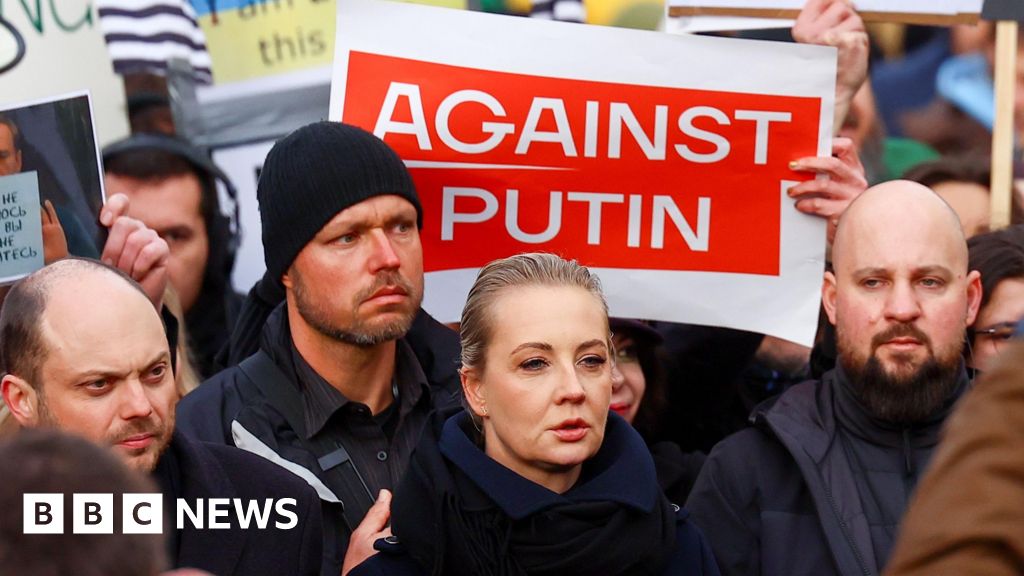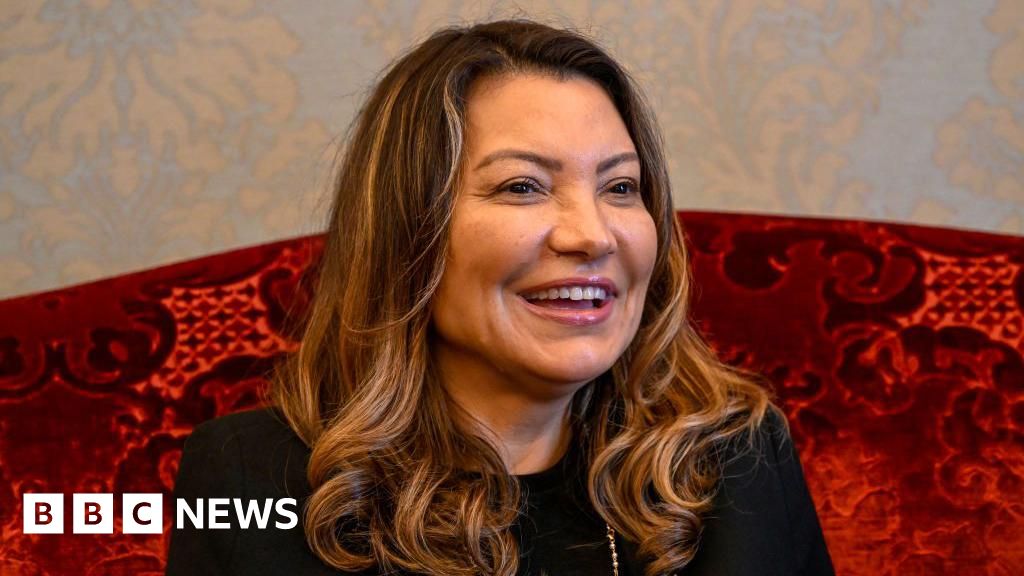ARTICLE AD BOX
By Jack Hunter
BBC News
Image source, NurPhoto/Getty Images
Image caption,The priest of the village of Yasnohorodka, near Kyiv, stands inside his destroyed church
Ukraine has accused Russia of damaging or destroying at least 59 religious sites across the country since its invasion began.
They include an Orthodox cathedral with its steeple ripped apart, a Jewish school struck by shelling, and parish churches left almost totally flattened.
Targeting historic monuments and cultural heritage sites is a war crime under international law, according to the Hague Convention.
Russia denies targeting religious sites, but the BBC has identified a number of religious sites that have suffered damage.
A shelled cathedral
St Michael's Cathedral was described by Mariupol's tourist office as "the most beautiful place" in the city's Left Bank district.
Offering "panoramic views of the Sea of Azov, green hills and coastal villages", the cathedral - opened in 1997 - attracted both worshippers and visitors alike, it said.
Image source, Getty Images
Image caption,Before the invasion, St Michael's Cathedral offered views of Mariupol's coastline
But after weeks of relentless Russian bombardment on the southern port city, the Orthodox cathedral's crowning dome is now a mangled heap of exposed steel and smashed brickwork.
Image source, Getty Images
Image caption,St Michael's Cathedral in Mariupol has suffered heavy damage
The cathedral's glass windows have been shattered, and gaping holes have been blown through its red-brick walls.
Image source, Getty Images
Image caption,The church's windows are shattered, its dome torn off, and its brickwork blasted apart
A parish church torn apart
A church in the small village of Yasnohorodka, about 40km (25 miles) west of Kyiv, has also been hit by shelling, the Ukrainian Orthodox Church says.
Image source, Getty Images
Image caption,Priest Romanov of Yasnohorodka stands in front of his church after it was hit by shelling
It says two shells struck the dome atop the Church of the Nativity of the Blessed Virgin on 5 March, seriously damaging its bell tower.
Its windows and doors were also reportedly laced with bullet holes from a heavy-calibre machine gun.
Amid heavy fighting, the Russian attack on the village that afternoon also killed a priest from another of the village's congregations.
Image source, Getty Images
Image caption,The church is littered with debris after its dome was reportedly hit by two shells
A synagogue struck
A Russian shell blew a hole in the roof of a yeshiva, used for religious study, in Ukraine's second-largest city Kharkiv, the city's Jewish community said in a post on its Facebook page.
The yeshiva building also functions as a synagogue, a secondary school and a dormitory, the post said.
Image source, JewishKharkov/Facebook
Image caption,A rocket blew a hole in the roof of a Jewish yeshiva in Kharkiv
"The rocket did not explode but made a large hole in the roof," the wife of Kharkiv's chief rabbi, Moshe Moskovitz, told Hebrew-language news site 0404.
The strike prompted the head of the World Synagogue Organisation, David Ben-Na'eh, to write to Russia's chief rabbi, Berel Lazar, urging him to ask Vladimir Putin to order the Russian military to stop damaging synagogues and holy places.
"Synagogues are a 'little temple' for the Jewish people everywhere. These have been the mainstay of Jews everywhere in the world for thousands of years," he wrote, urging Russia to preserve their "sanctity and integrity".
Russia denies hitting Jewish holy town
In an address to Israel's parliament last week, Ukraine's President Zelensky claimed Russia had struck the town of Uman, a site revered by many Hasidic Jews.
Mr Zelensky, who is Jewish, said Russian rockets hit the town on the first day of the invasion in February. Tens of thousands of Hasidic Jews travel to Uman every Rosh Hashanah (Jewish New Year) to visit the grave of Rabbi Nachman of Breslov, who revived the Hasidic movement and died in 1810.
Image source, Getty Images
Image caption,Tens of thousands of Hasidic and Orthodox Jewish pilgrims visit Uman every year (photo from 2018)
Moscow has denied the claim, sharing images of what it said were Ukrainian forces loading arms near a synagogue there.
"I want to underscore that the Russian armed forces do not strike civilian targets as part of the special military operation," Russian defence ministry spokesman Igor Konashenkov said.
But Uman's Jewish community has rejected claims about weapons near or in synagogues.
"All synagogues and Jewish sites in Ukraine are used exclusively for their intended purpose, to carry out religious activities or to help members of Jewish communities and the local population," the United Jewish Community of Ukraine wrote on its Telegram feed.
Image source, AFP/Getty Images
Image caption,Some Hasidic Jews have remained in Uman since the invasion began
And Irina Rybnitskaya, one of the remaining Jews in Uman, told Israel's Haaretz newspaper that Moscow's claims were "not true".
"Nobody is using synagogues for reasons except for the reasons synagogues should be used," she said.
A crumpled church in a wiped-out town
One church in the south-eastern city of Volnovakha has suffered severe damage after days of Russian bombardment.
The city's Temple of the Orthodox Church of Ukraine, built to honour Ukrainian soldiers who died fighting pro-Russian militants in 2014, is in ruins. The church's gold dome is mangled and its woodwork has been shredded.
Image source, Getty Images
Image caption,Volnovakha's Temple of the Orthodox Church of Ukraine has been left largely destroyed after days of bombardment
Image source, Reuters
Image caption,Pro-Russian troops patrol near the church in Volnovakha, eastern Ukraine
The regional governor of Donetsk has said Volnovakha - once home to some 22,000 people - "no longer exists".
Satellite images shared by Maxar Technologies, taken before and after the assault, reveal the extent of the damage.
Image source, Maxar Technologies
Image caption,Before and after satellite images show the damage inflicted on a church in Volnovakha
The devastation of Ukraine's spiritual sites has left many from its religious communities deeply shaken.
"It's a kind of nightmare, I cannot find any words to describe this," said Sergiy Berezhoy, a Kyiv priest from the Orthodox Church of Ukraine.
"It's horrible, it's unhuman," he told the BBC. "I don't know why Russian troops shoot at churches - if we're Christians we should care about peace."
Mr Berezhoy says he has still been holding small-scale services in his church in the capital amid a curfew and air raids.
"It's a place where people can find help, support," he says. "We are praying for our country - for each Ukrainian, for saving them."
War in Ukraine: More coverage
All images subject to copyright

 2 years ago
33
2 years ago
33








 English (US)
English (US)